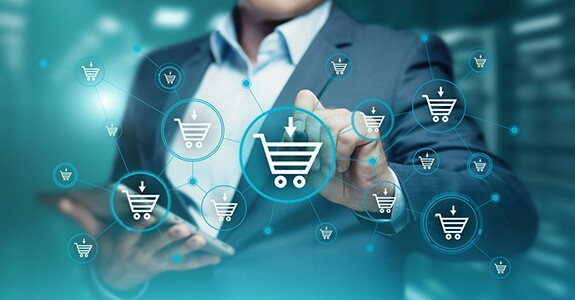How To
Quem é dono dos seus dados, afinal? Certamente não é você.
The Future Today Institute defende neste artigo que nossos dados pertencem a muita gente, muitas empresas e organismo, mas que certamente não temos mais controle sobre eles.
Quem é dono dos seus dados, afinal? Certamente não é você.
BuscarQuem é dono dos seus dados, afinal? Certamente não é você.
Buscar
The Future Today Institute defende neste artigo que nossos dados pertencem a muita gente, muitas empresas e organismo, mas que certamente não temos mais controle sobre eles.
Pyr Marcondes
22 de novembro de 2019 - 7h37
Who Owns Your Data? Hint… It’s Not You.
In recent months, we’ve seen a flood of headlines about personal data security, as Google, Facebook, and Apple strive to convince us—despite mounting evidence to the contrary—that their privacy policies and data management systems can be trusted by all users. “Privacy shouldn’t be a luxury good,” wrote Google CEO Sundar Pichai in a New York Times op-ed earlier this year.The problem? There is no such thing as privacy anymore.
We’ve already given up our privacy in exchange for the convenience of ostensibly free services and products. In fact, every day, you’re shedding massive amounts of data—not just where you shopped and what you bought, but also your intentions, interests, and idiosyncrasies, how many steps you’ve taken and who’s been at your front door.
Whether you’re at the mall or on the couch, you’re creating valuable data: how often you switch between your mobile device and computer. If you make more video calls than voice calls. What changed about your shopping cart from Sunday to Tuesday afternoon.
Today’s behavioral biometrics tools can map and measure in great detail how you interact with every screen you own, down to how much force you use to press down on keys and surfaces, and companies are racing to capture all that information and turn it into profit.
If you talk about Tiffany jewelry to a friend, then, somehow, you start receiving ads in your Twitter feed for Tiffany. Those kinds of ads, however, will be the least of our worries before long.
Soon, A.I. giants are going to be able to determine our mood minute to minute, cross-referencing those emotional assessments with our location and who we’re talking to, and deciding how best to serve us advertisements or calls to action about what we might need—or what we might be most willing to buy—at any given moment.
The Changing Definition of Data Ownership
There are real-world business implications when it comes to the future of data ownership. In most countries, when talking about “data ownership” this has typically referred to the legal rights to IP or copyrights. Determining what can be done with that data, and under what circumstances, should be a topic of conversation in every boardroom. Data governance may sound boring, but it should be a centerpiece of every corporate strategy.
In a world where every device is smart and connected, essentially “paying attention” to you at all times, surveillance is constant and boundaries of ownership are unclear. Those bits and bytes we constantly shed may originate from us, but that doesn’t mean they necessarily belong to us, which brings up thorny questions.
Questions, questions, questions….
Who is the legal guardian of our data? Do companies have the right to change end-user agreements regarding that data? What should data governance look like in an era of behavioral biometrics, an era when companies act as data brokers, profiting off of the information we give them, often without us fully realizing the extent of what we’ve shared?
We could go down an even more philosophical road. What does owning a piece of data look like? Is “ownership” a misnomer – does stewardship or guardianship better describe our relationship with data? What about your genetic data? If you take a 23andMe DNA test, who owns your genome? What happens to your enormous trail of data when you die?
Or grapple with this doozy: How do we define the self? As synthetic media and deep fakes take hold, this question gets even more blurry.
When it comes to IoT in our homes, is the data generated within our walls and physical spaces governed by privacy rights? Does the Fifth Amendment mean that wearables—our fitness trackers, connected bras, smart watches—can’t be used to self-incriminate us in court?
How, ultimately, should we define privacy in a digital era? These are questions that still must be answered collectively by companies, government officials and, frankly, anyone who breathes. Without careful thought and planning today, we could wind up on the wrong side of a valuable currency.
Emerging Tech Trend: Data as a Commodity
Key Insight: In the digital era, our data is currency. Who owns it? Who profits? As we shed more and more data, and big companies scoop it up, the physical and digital realms will merge seamlessly together. While consumers will see enriched, personalized experiences, companies, regulators and consumers must sort out who owns that data, where it’s stored, how it’s used and who ultimately owns it.
Examples: As Amazon, Google and Apple enter the financial payments space, we ought to ask what happens when the value of the data is greater than the monetary value of the transaction. What if any of these companies started trading using its proprietary data on credit cards? Or on e-commerce data? This would put many other companies at a competitive disadvantage. Could there be a new (hidden) future cause of inflation rooted in data?c
Last year, DNA-testing company 23andMe said it would share consumers’ anonymized genetic data with pharmaceutical giant GlaxoSmithKline. BioCatch built a system to build individual user profiles and know within seconds if you’ve logged into a computer using someone else’s username and password. Amazon recently confirmed that Alexa hangs onto your voice data, even if you delete it. Could we envision a future in which your company might use biometric data ethically? What will our future regulatory environment look like with all this data?
What’s next: The big tech companies will continue to face regulatory scrutiny in the coming year, and investors are paying attention. Most of the focus is on antitrust concerns and privacy. Meanwhile, most people may continue to have no idea just how much data they’re generating—and what might be done with it.
Near-Futures Scenarios (2023 – 2028):
• Pragmatic: Regulators become better educated about the ins-and-outs of personal data collection, and users become more informed about the potential misuse of their data. Powerful companies that have already profited off of harvested data lobby against or circumvent restrictions on irresponsible data collection and security practices, but the government successfully restricts the most egregious cases of data trafficking and misuse.
• Catastrophic: Tech companies take a page from today’s banks, which are incentivized to encourage consumer debt that when compounded, leads to more profit. Just as bank customers can become hopelessly buried in financial debt, tech users find themselves in “data debt,” committed to providing deeper and deeper levels of personal data in exchange for indispensable services. Eventually, that person’s every thought and action is quantified, seized, and made available for sale by the new debt collectors of the tech sector.
• Optimistic: Data becomes a naturally generated personal currency. Transparency, data portability and system interoperability are prioritized. How personal and company data are collected, who owns it, and who profits is made clear to everyone. Consumers use tools that let them manage their permissions, deciding which data can be bought, sold, and bartered.
Action Meter:
Watchlist: Amazon; Apple; Amazon; IBM; Microsoft; Google; 23andMe; Biocatch; Facebook; Twitter; Snap; State of Maine; Nielsen; Palantir; U.S. Congress; China’s CCP; Baidu; Alibaba; Tencent; European Union; Brexit negotiators; consumer privacy groups.
New Research Available
The Future Today Institute’s research is open source. We invite you to read, share and build on our work.
Our 3rd annual Entertainment Media and Technology Trends Report. This industry-specific report has 157 trends for 2020 and launched on Saturday, September 14th. Read more and download here.
How To Do Strategic Planning Like A Futurist – Published in the Harvard Business Review. Futurists think about time differently, and company strategists could learn from their approach. For any given uncertainty about the future — whether that’s risk, opportunity, or growth — we tend to think in the short- and long-term simultaneously. To do this, FTI uses a framework that measures certainty and charts actions, rather than simply marking the passage of time as quarters or years. That’s why FTI’s timelines aren’t actually lines at all — they are cones. Read our research and download the HBR article to share with your team.
2019 Emerging Tech Trends Report – Launched at SXSW. The Future Today Institute’s 2019 Tech Trends Report is in its 12th year of publication and has received more than 7.8 million cumulative views. This is our biggest tech trends report ever––a 30% increase over last year, when we identified 225 trends and 10 weak signals. This sharp increase has to do with the advancement of many different technologies, which is causing acceleration across many different fields. Download a free copy of the full report or purchase a printed copy – details for both are here. View the entire report on Slideshare (part 1 and part 2) or read a synopsis on Medium.
Veja também

O que é e como funciona o advergaming
Até o final de 2030, os jogos para dispositivos mobile devem atingir um valor aproximado de US$ 272 bilhões, já tendo atingido US$ 98 bilhões em 2020

Publicidade digital chega a R$ 23,7 bi e segue em expansão
Anunciantes que investem em canais digitais cresceram 57%, mas setor ainda está em desenvolvimento, segundo especialistas